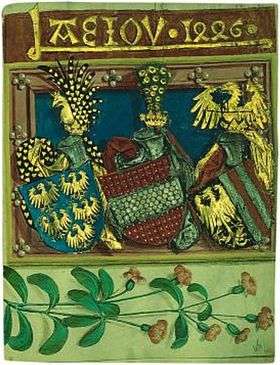A.E.I.O.U.

"A.E.I.O.U." was a symbolic device personally used by the Habsburg emperor Frederick III (1415–93), who had a fondness for mythical formulae. He habitually signed buildings such as Burg Wiener Neustadt or Graz Cathedral as well as his tableware and other objects with the acronym.[1] Up to today, A.E.I.O.U. is the motto of the Theresian Military Academy established in 1751.
Interpretation

Frederick already had begun to use the signature when he was elected King of the Romans in 1440. He did not explain its meaning at the time, though, shortly before his death, he claimed it stood for German: Alles Erdreich ist Österreich untertan (MKL 1890)[2] or "All the world is subject to Austria."
However other interpretations have been put forth even by contemporary heraldists. Several explanations proceed on the assumption that it was meant as a political slogan, from the Latin phrases:
- Austria est imperio optime unita ("Austria is the empire best united").
- Austria erit in orbe ultima ("Austria will be the last (surviving) in the world") (MKL 1890).[2]
- Austriae est imperare orbi universo ("It is Austria's destiny to rule the whole world") (MKL 1890).[2]
More than 300 Latin and German interpretations have been attempted over the centuries; most of these versions refer to a motto of present-day Austria or the huge Habsburg Monarchy.
See also
- Fiat iustitia, et pereat mundus – the motto of Ferdinand I.
- FERT – Another motto of a European dynasty (the House of Savoy) whose meaning and origin is unclear.
- In his novel, Ulysses, James Joyce uses the device for comic effect after Stephen Dedalus borrows money from George Russell, a Dublin writer whose pen name was A.E.: 'A.E.I.O.U.'
References
- ↑ Brewer, E. Cobham (1978) [reprint of 1894 version], The Dictionary of Phrase and Fable, Edwinstowe, England: Avenel Books, p. 1, ISBN 0-517-25921-4
- 1 2 3 "A", Meyers Konversationslexikon, (various authors), Volume 1, page 1, 1885-1890, web (Commons): MKL-b1-p1: has "A.E.I.O.U." on first page of entire 16-volume encyclopedia, as 3 Latin phrases: "Austriae est imperare orbi universo" and "Austriae est imperium orbis universi" with the German phrase "Alles Erdreich ist Oesterreich unterthan" noted with "Friedrich III.", plus a 3rd Latin phrase "Austria erit in orbe ultima" with "Österreich wird bestehen bis ans Ende der Welt" ("Austria will stand until the end of the world"); note that "Oesterreich" is "Österreich" ("Oe") with first letter "O". "Ö" is not considered a separate letter in German.
Further reading
- Andrew Wheatcroft's The Habsburgs: Embodying Empire (1995), ISBN 0-14-023634-1.
External links
 Media related to A.E.I.O.U. at Wikimedia Commons
Media related to A.E.I.O.U. at Wikimedia Commons